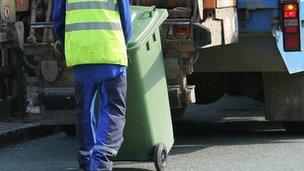What is it that Cosla does?
- Published

Cosla helps local councils make collective decisions on public service policies
The Convention of Scottish Local Authorities (Cosla) is an organisation most people in Scotland will have heard of, but how many really understand what it is and what it does?
For the past few weeks, a dispute has been escalating which could see Cosla split.
Seven of Scotland's 32 councils have said they may leave and some others are watching closely.
It is all a dispute about where power should lie within the organisation, which in itself is perhaps only of interest to those who take an active interest in local government.
Shared interests
A row over just how government cash should be spread between councils brought it to the boil.
But away from this dispute - what is it that Cosla does?
Its mission statement, if you like, is to represent the shared interests of all Scotland's councils.
That's all very well when it comes to the motherhood and apple pie stuff - like celebrating the hard work of staff- but on more controversial issues just what is that shared interest now?
Labour leads half of Scotland's councils but overall the SNP has more councillors so can claim to be the largest party in local government.
The practical effect of this is that it can be hard for Cosla to take a strong line on controversial political issues and, unsurprisingly, these party political tensions can come to the fore.
Labour councils are increasingly unhappy about the terms of the council tax freeze - the SNP takes the view it is doing the best it can for councils in hard times.

Education is the largest area in council spending
Critics also argue there has been creeping centralisation in recent years and that since the Scottish Parliament was set up, local government has been eclipsed by Holyrood.
Indeed - it was once very different.
In the 1980s and early 90s big Labour councils such as Strathclyde were among the most powerful voices in civic Scotland, powerfully condemning some UK government policies, especially the poll tax.
In those days, before proportional representation, Labour dominated local government in much of Scotland - some joked that some Labour councils were practically one party states - and Labour inevitably, dominated Cosla too.
And for all their genuine differences, at least Labour, the SNP and the Lib Dems could all agree on what they opposed - the policies of Margaret Thatcher and John Major's governments.
Genuine disagreements
So, there was Cosla. Like all of Scottish local government, perhaps a part of a surrogate expression of distinct political identity or even nationhood.
There's no doubt that since devolution, the relationship between local and central government has been very different.
While there have been some genuine disagreements, it has been much more respectful.

National pay bargaining for council staff is one of Cosla's functions
If nothing else, many councils and Holyrood sing from the same hymn sheet even if the tune is not always quite the same and in general many councils have a relatively good relationship with Holyrood.
More recently, that relationship has been strained with some Labour councils being more critical of the government but of course it is no longer possible in practice for an organisation such as Cosla to take a clear, critical line on policies many other councils support.
So are this organisation's days numbered?
Well, its president David O'Neill is a Labour councillor himself and he thinks not.
He argues Cosla has done a pretty good job - standing up for councils and helping protecting them from the worst of public spending cuts.
It has done a far better job than its English equivalent of which many councils are not members, he says.
In real terms, English councils have seen their budgets fall 14% since 2010 - in Scotland the fall has been just 3%.
More subtle
Scottish councils have maintained their share of total public sector spend or even increased it, in England the share has gone down.
So would it actually matter if Cosla split in two if some councils thought they would get a better deal outside?
It will not affect local services directly if a council leaves Cosla and it may be possible to find ways of maintaining things such as national pay bargaining for council staff but perhaps there is still a question to be asked.
Is the success of the organisation measured by rows with the government and clear disagreements? Or might the results be more subtle? About what might have happened if Cosla was not there to stick up for councils.
One thing Cosla is keen to talk about is how local democracy may evolve after the referendum - whether it is a yes or a no vote.
It has set up a commission to think up ideas, which should report soon. As with any such report, some will wonder if it will actually play a part in the evolution of Scotland or quietly gather dust.
Certainly the more powerful Cosla is, the greater the chance of its views carrying influence.
- Published5 March 2014
- Published28 February 2014
- Published10 February 2014